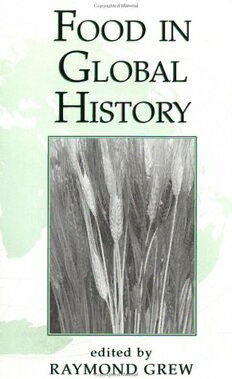
Food in global history PDF
304 Pages·1999·49.891 MB·English
Most books are stored in the elastic cloud where traffic is expensive. For this reason, we have a limit on daily download.
Preview Food in global history
Description:
Social scientists have studied foods in many different ways. Historians have most often studied the history of specific foods, and anthropologists have emphasized the role of food in religious rituals and group identities. Sociologists have looked primarily at food as an indicator of social class and a factor in social ties, and nutritionists have focused on changing patterns of consumption and applied medical knowledge to study the effects of diet on public health. Some scholars from these and other disciplines have studied the economic and political connections created around commerce in food, regionally and around the world. Now, all of these perspectives are brought together in a single volume. Fifteen specialists currently working in Canada, England, France, Guatemala, Norway, and the United States come together to apply their expert knowledge of food and food consumption in a new context, global history. In general essays and case studies, they reflect on the connections across space and time in what people eat and assess historical patterns of change in the human diet.The book begins with a consideration of the relationship between food and global history. Part One considers the global history of the ecology of food production, the contrasting impact of New World foods on India and China, the effects of global tourism, and the interaction between identity, migration, and diet. The selections in Part Two study the impact of public policy, comparing the countries of the former Soviet bloc with Scandinavia and Western Europe, analyzing the effects of international assistance on West Africa, and looking at changes in childhood nutrition in developing countries. Chapters in Part Three study nutritional change, the dietary effects of increased wealth, and the ”Mad Cow” crisis in terms of global systems. Part Four investigates the relationship of global change to the ideologies and practices of the family meal, of food and cultural identity in Japan, and the American counterculture.
See more
The list of books you might like
Most books are stored in the elastic cloud where traffic is expensive. For this reason, we have a limit on daily download.
